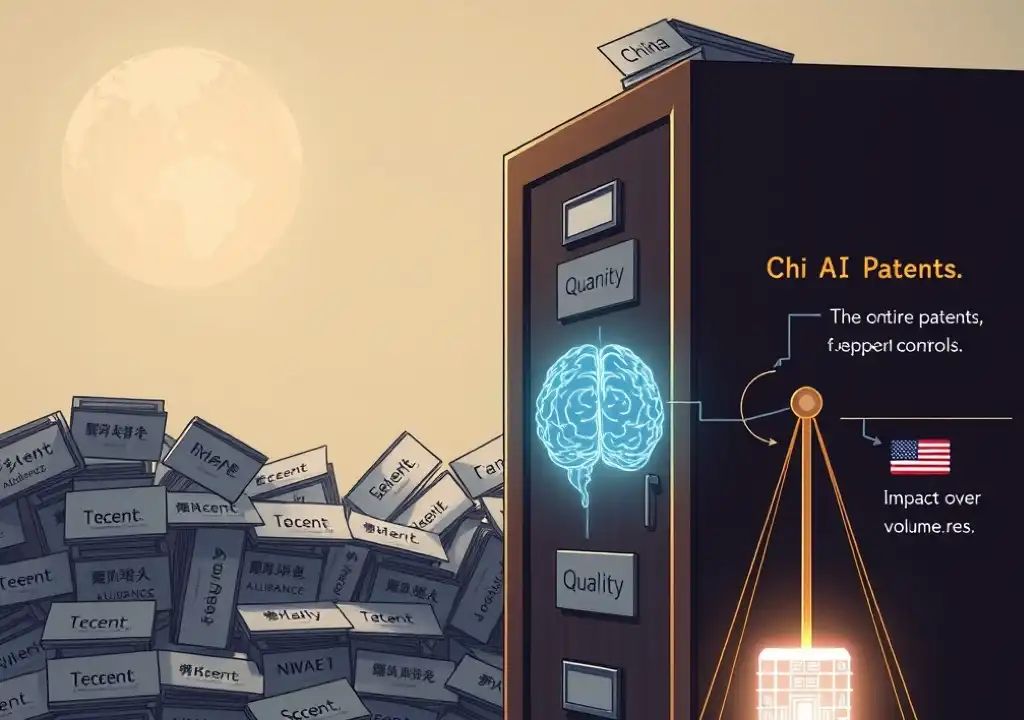China leads in patent filings but faces challenges in innovation and global competitiveness due to US export restrictions and internal systemic issues.
China has become the world leader in filing generative AI patents, yet it faces significant challenges in turning these filings into impactful innovations. Alongside limitations from US technology export bans, the country also struggles with deeper issues tied to its innovation ecosystem.
According to the UN’s intellectual property agency, China filed over 38,000 generative AI-related patents in the past ten years, surpassing all other nations combined. This prolific output places major Chinese entities like Tencent, Baidu, Ping An Insurance, and the Chinese Academy of Sciences among the world’s top 10 patent holders, per data from the World Intellectual Property Organization (WIPO).
In contrast, only four US organizations made that list. From 2014 to 2023, US-based entities submitted 6,276 patents, while South Korea followed with 4,155, Japan with 3,409, and India with 1,350.
Despite the patent volume, analysts argue China still lags behind the US in terms of technological impact. Dr. Van Anh Le, an intellectual property law scholar at Durham University, notes that patent quantity doesn’t necessarily reflect meaningful innovation. “A high patent count can stem from strategic reasons, national policy incentives, or even non-innovative motives,” she said, emphasizing that patents alone don’t guarantee commercial success or real breakthroughs.
The US, despite filing fewer patents, continues to lead in tangible generative AI advancements. Stanford University’s 2024 AI Index ranked the US as the dominant creator of influential AI models, with 61 notable models compared to 21 from the EU and 15 from China.
This trend started with Google’s 2017 development of the “transformer” architecture, which powers today’s leading large language models (LLMs) such as ChatGPT. The launch of ChatGPT in 2022 was a turning point, described by Nvidia CEO Jensen Huang as AI’s “iPhone moment.” While China has released competing tools like Baidu’s ERNIE bot, none have achieved global recognition on the same level.
Patent Focus Primarily Domestic
China’s ability to compete has been further hindered since 2022 due to US-imposed restrictions on key technologies like the NVIDIA A100 chips, which are essential for developing advanced AI models.
Alex He, a senior fellow at the Canadian-based Center for International Governance Innovation (CIGI), said that despite China’s high patent filings, it has struggled to translate them into transformative AI tools like LLMs. A lack of high-performance computing infrastructure and massive datasets has limited China’s progress.
While some US firms like Intel and Nvidia have adapted their chips to comply with export rules for the Chinese market, many Chinese tech firms are now relying on domestic alternatives like Huawei’s Ascend chips, according to a report from the National Bureau of Asian Research.
China’s AI sector is also largely domestically oriented. He estimates that only 2,926 of China’s generative AI patent applications were filed overseas—a reflection of China’s traditionally low international filing rates. He said companies like Tencent, Ping An, Baidu, Alibaba, ByteDance, and the Chinese Academy of Sciences primarily focus on the local market. Only firms with existing global operations—Huawei, Vivo, and ZTE—are consistently filing abroad.
Many patents, He added, are designed for internal functions, such as enhancing business processes or improving app functionality. Baidu stands out as one of the few firms actively investing in foundational AI research, though it continues to face limitations in acquiring cutting-edge AI chips.
Incentives Prioritize Numbers Over Breakthroughs
While China’s private sector has produced a solid volume of useful generative AI patents, driven by real industry needs, He believes there’s a persistent issue of valuing patent quantity more than quality.
In some cases, developers and companies may be incentivized to submit patent applications simply to qualify for government support, individual career advancement, or official high-tech enterprise status, according to Le.
She compared the Chinese government’s approach to that of a giant state-backed startup accelerator, akin to a “national Y Combinator” with broader influence and longer-term ambitions—referring to the US-based incubator known for launching companies like Airbnb, Stripe, and Dropbox.

